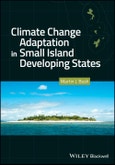A groundbreaking synthesis of climate change adaptation strategies for small island states, globally
A wide ranging, comprehensive, and multi-disciplinary study, this is the first book that focuses on the challenges posed by climate change impacts on the Small Island Developing States (SIDS). While most of the current literature on the subject deals with specific regions, this book analyses the impacts of climate change across the Caribbean, the Pacific Ocean, and the African and Indian Ocean regions in order to identify and tackle the real issues faced by all the small island States.
As the global effects of climate change become increasingly evident and urgent, it is clear that the impact on small islands is going to be particularly severe. These island countries are especially vulnerable to rising sea levels, hurricanes and cyclones, frequent droughts, and the disruption of agriculture, fisheries and vital ecosystems. On many small islands, the migration of vulnerable communities to higher ground has already begun. Food security is an increasingly pressing issue. Hundreds of thousands of islanders are at risk. Marine ecosystems are threatened by acidification and higher seawater temperatures leading to increased pressure on fisheries - still an important source of food for many island communities.
The small island developing States emit only small amounts of carbon dioxide and other greenhouse gases. Yet many SIDS governments are allocating scarce financial and human resources in an effort to further reduce their emissions. This is a mistake.
Rather than focus on mitigation (i.e., the reduction of greenhouse gas emissions) Climate Change Adaptation in Small Island Developing States concentrates on adaptation. The author assesses the immediate and future impacts of climate change on small islands, and identifies a range of proven, cost-effective adaptation strategies. The book:
- Focuses on the challenges of climate change faced by all of the world’s small island developing States;
- Provides comprehensive coverage of the latest research into the most likely environment impacts;
- Uses numerous case studies to describe proven, practical, and cost-effective policies, including disaster management strategies - which can be developed and implemented by the SIDS;
- Takes a unique, multidisciplinary approach, making it of particular interest to specialists in a variety of disciplines, including both earth sciences and life sciences.
This book is a valuable resource for all professionals and students studying climate change and its impacts. It is also essential reading for government officials and the ministries of the 51 small island developing States, as well as the signatories to the 2015 Paris climate agreement.
Table of Contents
Preface xi
Abbreviations and Symbols xiii
1 The Changing Climate 1
Introduction 1
Recent Impacts of Climate Change 6
Reports From the Front Line 8
Future Shock 10
Warming the Oceans 12
Multidimensional Threats 14
References 17
2 Small Island Developing States 19
Meet the SIDS 20
Demography 23
Social Development 24
Economic Vulnerability 24
Climate Change Impacts on Small Islands 27
Coastal Zones: A Clear and Present Danger 28
Coastal Zones: Terrestrial and Intertidal Impacts 30
Coastal Marine Ecosystems 32
Low Elevation Coastal Zones 40
Agriculture 48
Fisheries 49
Food Insecurity 52
Undernourishment in the SIDS 54
Poverty and Climate Change 54
Tourism 56
Freshwater Resources 58
Human Health 59
ClimateÂ]driven Migration 60
References 61
3 Adapting to a Changing Climate 65
EcosystemÂ]based Adaptation 66
Adaptation in Coastal and Marine Environments 67
Marine Protected Areas 72
Three Bays Protected Area in Haiti 75
Climate Change Adaptation in Agriculture 90
Conservation Agriculture 92
Rice Production 97
Irrigation 100
Adaptation Technologies for Agriculture 100
Water Resources Management 102
Integrated Water Resources Management (IWRM) 103
Agricultural Water Management (AWM) 105
Rainwater Harvesting and Management 106
Wastewater Treatment and Recycling 108
Reclaimed Water for Agricultural Use 110
Fisheries and Aquaculture 112
Disaster Risk Management 115
Adaptation and Mitigation Synergies 116
References 117
4 Adapting Energy Systems 121
Depending on Energy 122
Access to Electricity 123
Renewable Energy 124
Photovoltaic (PV) Electricity 127
Minigrid Systems 129
Distributed PV Systems 132
Wind Power 134
Solar Water Heaters 136
Hydropower 138
Geothermal Energy 139
Solar Thermal Power 139
Energy Efficiency 140
References 142
5 Managing Adaptation 145
The Key Climate Hazards 145
The Regulatory Framework 150
National Adaptation Programs of Action 151
Financing Adaptation 152
The Green Climate Fund 154
The Adaptation Fund 156
Programme Development 158
Geographical Information Systems 162
References 163
6 Country Profiles 165
American Samoa 165
Anguilla 167
Antigua and Barbuda 168
Aruba 170
Contents ix
The Bahamas 171
Bahrain 173
Barbados 174
Belize 175
British Virgin Islands 176
Cabo Verde 178
Comoros 179
Cook Islands 180
Cuba 181
Dominica 182
Dominican Republic 183
Fiji 184
French Polynesia 186
Grenada 187
Guam 188
GuineaÂ]Bissau 189
Guyana 189
Haiti 190
Jamaica 192
Kiribati 193
Maldives 194
Marshall Islands 195
Mauritius 196
Micronesia, Federated States 197
Montserrat 198
Nauru 199
New Caledonia 200
Niue 201
Northern Mariana Islands 202
Palau 202
Papua New Guinea 203
Puerto Rico 204
Saint Kitts and Nevis, Saint Lucia, Saint Vincent and the Grenadines 205
Samoa 206
Sao Tome and Principe 206
Seychelles 207
Singapore 209
Solomon Islands 210
Suriname 211
TimorÂ]Leste 212
Tonga 213
Trinidad and Tobago 214
Tuvalu 214
US Virgin Islands 215
Vanuatu 216
References 216
Index 219








